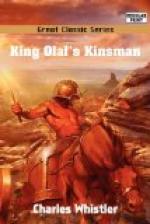I suppose that I had been in the place for two hours or more, and the morning sky had changed strangely since the fight began. The sun was hidden with a great mass of heavy clouds that were driving up fast from the southwest, although the woods around us were still and motionless in the hot, heavy air. The smoke that still rose from the burnt houses went up straight as a pine tree.
Olaf looked up at the sky, and seemed anxious.
“There is a gale brewing,” he said. “I am glad Rani is with the ships.”
Then he walked away to a spur of the hill that looked down the valley towards the sea. We could see all the tidal water, and almost to Pevensea, and there came a long murmur of the sea on the pebble beach, even to where we stood, so hushed were all things. Surely there was a heavy sea setting in to make so loud a noise as that. And all the hills and marshes seemed close at hand, so clear was the air.
Then came to us Olaf’s ship master, and he was uneasy also.
“Tide is at its highest tonight,” he said, “and if the wind gets up from the southwest, as seems likely, it will be higher yet than usual. See how the clouds whirl over us.”
Then the king went back to the building and called to Wulfnoth, who came up the ladder asking what was amiss, for he heard that Olaf’s voice was urgent.
“Here is a gale coming,” the king said, “and we must be back with the ships.”
Wulfnoth came out into the open and looked round.
“Aye; and tide will be high at the causeway. These spring tides run wildly at this time of year,” he said. “We must be going.”
Then was no more delay, but the horns blew the recall, and the men came in. We had lost none, but I do not think that many outlaws were left.
They brought a farm horse, with baskets slung across its back in the Sussex manner, and into them the gold was put. I looked down into the vault as the men left it, and saw that Relf was there, and that they had tried every great stone in the walls in search of another chamber, but that there had not been one. And when he came up I was about to draw up the ladder after him, and looked down for the last time.
There at the ladder’s foot sat the elvish toad, and it seemed to me that it looked pitifully up at the light. How many years might it have been without sunlight or touch of dew or cool green leaves that it had loved? And I was fain to climb down and take it up in my hand and set it free on the grass outside the house, where a dock spread its broad leaves. It crawled under them in haste, and I saw it no more. Then I found that Spray the smith was watching me, and he said a strange thing.
“That is a good deed, master,” he said. “I think that you shall never be in prison.”
“May I never be so,” I answered, wondering.
“I am a forest-bred man,” he said, “and I love all beasts,” and then he turned away, and went to the men who were waiting for the earl’s word.




